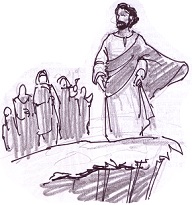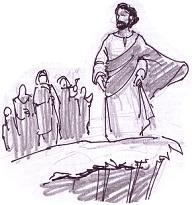

“Jesus returned to Galilee in the power of the Spirit, and news of him spread throughout the whole region” (Luke 4:14).
1 John 4:19—5:4; Luke 4:14-22
In today’s Gospel, Jesus returns Nazareth at the height of his powers and reputation. His family and neighbors welcome him as a celebrity. He resumes his customary attendance at the synagogue and is asked to read from the scroll of the prophet Isaiah. He chooses a passage that describes a servant filled with the Spirit and anointed to announce good news to the poor.
Jesus’ rise to popularity is already controversial, for, unlike most other career-conscious leaders trying to make connections and increase their influence, he has different emphasis and mission. He will champion the poor, focus on the oppressed, imprisoned, blind and outcast. He proposes a jubilee year, a time of radical social reorganization and the cancellation of all debts, a way to restore the common good. This is not exactly a campaign likely to attract support from the status quo or the rich and powerful.
We know from the rest of the story that after a burst of enthusiasm from the home crowd, many will become indignant at Jesus for claiming to be this special servant of God and for not working miracles in Nazareth. In the end, his own neighbors will turn into a mob and try to throw him over a cliff.
In a world where might makes right and the poor and needy make their way to the bottom of the social order, to preach justice and love, forgiveness and compassion seems like fantasy. Popular adulation can quickly turn to mob rejection. Humility is ridiculed as weakness; arrogance is praised as a sign of confidence. Measured thoughtfulness is swept aside by manipulation and propaganda.
Jesus knew from his temptations in the desert that the Servant of God would not fulfill his mission with bread, miracles or by bowing to power. Satan’s hold on history would be broken by self-effacing love and personal sacrifice. Jesus would fulfill the Law and the Prophets not by emulating worldly power, but by exposing its ultimate futility in contrast to the real power of truth, justice and love. By his death on the cross, Jesus would take the lowest place of all, then turn the world upside down by rising to reveal God’s glory.
Every disciple stands with Jesus in the synagogue at Nazareth as he reads from the scroll of the prophet Isaiah. The Spirit of the Lord is upon us now and we are anointed to announce and live the Good News Jesus proclaaimed by his life, death and resurrection. The challenge for us is whether we are all in, committed and open to sharing his path of humble service and self-sacrificing love. If we say yes, then the Word will come true in our hearing.
Advertisement






